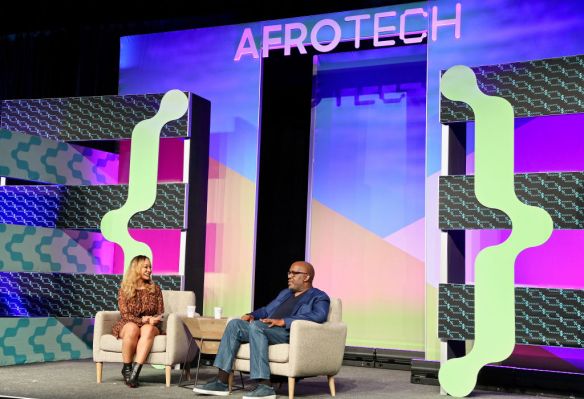The AfroTech Conference, one of the nation’s most prominent Black tech gatherings, will touch down in Austin on November 13 for its first in-person event since 2019.
The event is put on annually by the publication AfroTech, with this year’s theme being web3. High-profile speakers for the conference include NASCAR driver Bubba Wallace, billionaire Mark Cuban and “venture rapitivist” — VC and rapper — Chamillionaire, who will speak about brand building and investments. Other speakers include 15 Percent Pledge founder Aurora James, Career Karma CEO Ruben Harris and Backstage Capital founder Arlan Hamilton.
Speaking to TechCrunch, Morgan DeBaun, the co-founder and CEO of AfroTech’s parent company, Blavity, said this year’s event aims to bridge the gap between music, culture, technology and fintech. It’s added new sessions and programming to help build the skills of attendees in various technical positions and will host workshops on how to find mentors and advisers.
“Tech continues to be the fastest-growing industry in the world,” DeBaun told TechCrunch. “We want to make sure that our community is not just getting the early career jobs, but actually making it all the way through the career ladder.”
Unlike many other tech conferences, culture and music play a central role at AfroTech. DeBaun said her goal was to make the event as entertaining as possible, and music is a defining feature of African American culture. There will be live musical performances from artists like Bia, Wale and Zaytoven, and Disney will premiere “Black Panther: Wakanda Forever.”
In the past three years, DeBaun said more companies have taken an interest in partnering with AfroTech and expanding opportunities for Black talent. A key part of conferences like this is exposing the Black community to the resources, networks and knowledge often gatekept. TechCrunch previously reported that venture capital is a closed-off industry; the startup world is not accessible to some. The more interest the tech world takes in events such as this, the more the floodgates open to allowing Black talent into the room.
The conference expects executives from Meta, Salesforce, Google and Amazon, and many corporate sponsors will be hosting their own events and dinners. This will serve as a way for companies to recruit Black talent and for prospective employees to gauge how well they will fit in at a company and how authentic their mission to support Black talent feels.
“More brands and companies view the Black audience as really critical to their businesses, whether it’s from a talent point of view or a customer point of view,” DeBaun continued. “It makes the entire ecosystem more rich.”
Ebony Thomas, the president of the Bank of America Foundation and a racial equality and economic opportunity executive, said her company is partnering with Blavity to host a local business showcase at local HBCU Huston-Tillotson University.
“Gatherings like this help everyone keep their foot on the gas,” she said of Bank of America’s involvement. “We’re all in the same room — the founders, the funds, the bankers, nonprofits, the media, and we get to work together on ways to address challenges and make progress.”
Elsewhere, Harris will be speaking on the main stage to shine a light on the successful women of color who have used his company and gone on to help others land high-profile tech and consulting jobs. At the same time, tech strategist Salina Fountain is attending the event on behalf of her client Five to Nine, an event platform started by two Black women, which recently raised a $4.25 million seed round.
She hopes to network and use the event to see how she can further be a champion for DEI.
“‘I’ll be in the front row to learn more about NFTs, real estate, technology and see Wale perform,” she told TechCrunch. “Being a Black woman in tech is very special. When you are in, you can motivate, inspire and lead others toward financial freedom and stability alongside you.”
Thomas added that conferences like this are important for the Black community because they can create a pipeline that contributes to a more diverse, inclusive and innovative tech industry. Looking at recent stats, it’s evident that the industry needs more of these. A lot more.
“We have to be focused on building economic opportunities for the Black community in a sustainable way,” Thomas said. “Catalyzing growth for entrepreneurs who then invest back in their communities is such a powerful way to achieve that — and that’s really what this is all about.”
